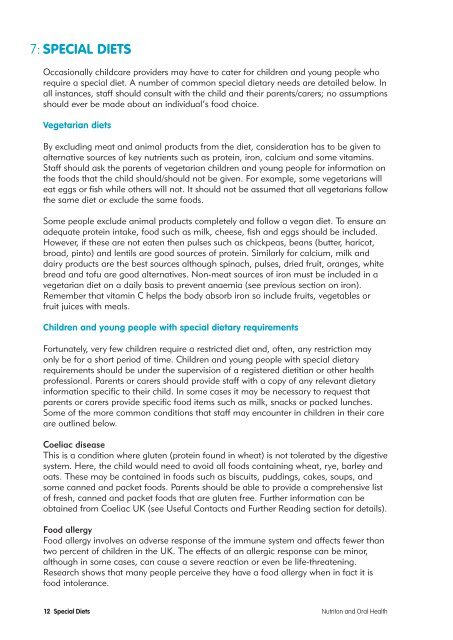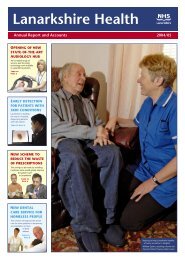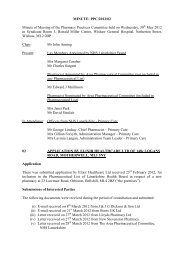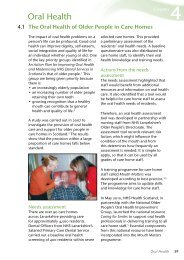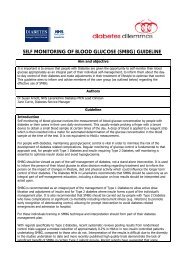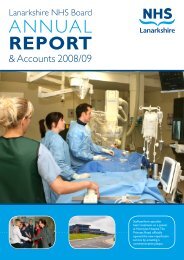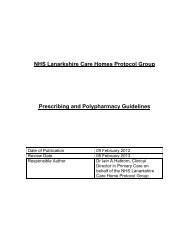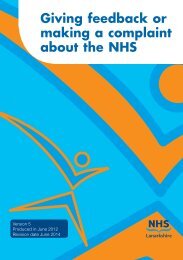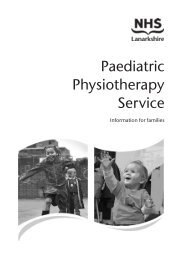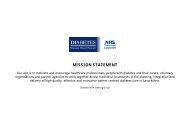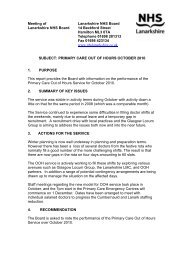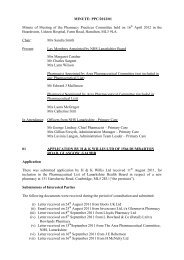Nutrition and Oral Health - Strategy into Practice ... - NHS Lanarkshire
Nutrition and Oral Health - Strategy into Practice ... - NHS Lanarkshire
Nutrition and Oral Health - Strategy into Practice ... - NHS Lanarkshire
- No tags were found...
You also want an ePaper? Increase the reach of your titles
YUMPU automatically turns print PDFs into web optimized ePapers that Google loves.
7: SPECIAL DIETSOccasionally childcare providers may have to cater for children <strong>and</strong> young people whorequire a special diet. A number of common special dietary needs are detailed below. Inall instances, staff should consult with the child <strong>and</strong> their parents/carers; no assumptionsshould ever be made about an individual’s food choice.Vegetarian dietsBy excluding meat <strong>and</strong> animal products from the diet, consideration has to be given toalternative sources of key nutrients such as protein, iron, calcium <strong>and</strong> some vitamins.Staff should ask the parents of vegetarian children <strong>and</strong> young people for information onthe foods that the child should/should not be given. For example, some vegetarians willeat eggs or fish while others will not. It should not be assumed that all vegetarians followthe same diet or exclude the same foods.Some people exclude animal products completely <strong>and</strong> follow a vegan diet. To ensure anadequate protein intake, food such as milk, cheese, fish <strong>and</strong> eggs should be included.However, if these are not eaten then pulses such as chickpeas, beans (butter, haricot,broad, p<strong>into</strong>) <strong>and</strong> lentils are good sources of protein. Similarly for calcium, milk <strong>and</strong>dairy products are the best sources although spinach, pulses, dried fruit, oranges, whitebread <strong>and</strong> tofu are good alternatives. Non-meat sources of iron must be included in avegetarian diet on a daily basis to prevent anaemia (see previous section on iron).Remember that vitamin C helps the body absorb iron so include fruits, vegetables orfruit juices with meals.Children <strong>and</strong> young people with special dietary requirementsFortunately, very few children require a restricted diet <strong>and</strong>, often, any restriction mayonly be for a short period of time. Children <strong>and</strong> young people with special dietaryrequirements should be under the supervision of a registered dietitian or other healthprofessional. Parents or carers should provide staff with a copy of any relevant dietaryinformation specific to their child. In some cases it may be necessary to request thatparents or carers provide specific food items such as milk, snacks or packed lunches.Some of the more common conditions that staff may encounter in children in their careare outlined below.Coeliac diseaseThis is a condition where gluten (protein found in wheat) is not tolerated by the digestivesystem. Here, the child would need to avoid all foods containing wheat, rye, barley <strong>and</strong>oats. These may be contained in foods such as biscuits, puddings, cakes, soups, <strong>and</strong>some canned <strong>and</strong> packet foods. Parents should be able to provide a comprehensive listof fresh, canned <strong>and</strong> packet foods that are gluten free. Further information can beobtained from Coeliac UK (see Useful Contacts <strong>and</strong> Further Reading section for details).Food allergyFood allergy involves an adverse response of the immune system <strong>and</strong> affects fewer thantwo percent of children in the UK. The effects of an allergic response can be minor,although in some cases, can cause a severe reaction or even be life-threatening.Research shows that many people perceive they have a food allergy when in fact it isfood <strong>into</strong>lerance.12 Special Diets Nutriton <strong>and</strong> <strong>Oral</strong> <strong>Health</strong>


